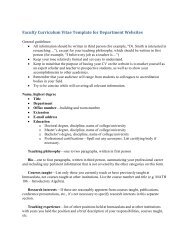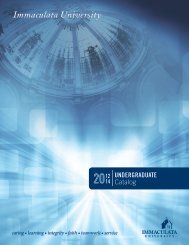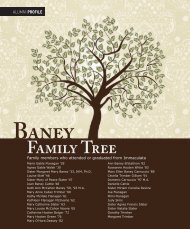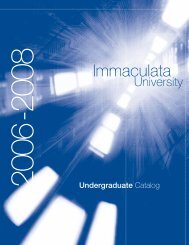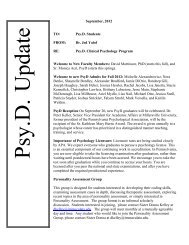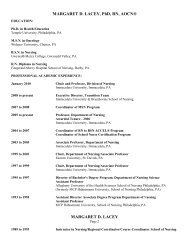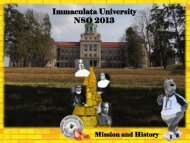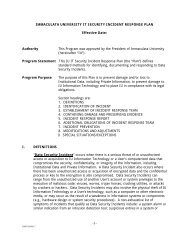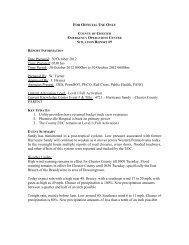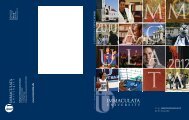Undergraduate Catalog 2008-2010 - Immaculata University
Undergraduate Catalog 2008-2010 - Immaculata University
Undergraduate Catalog 2008-2010 - Immaculata University
You also want an ePaper? Increase the reach of your titles
YUMPU automatically turns print PDFs into web optimized ePapers that Google loves.
Sociology - Criminology<br />
Frank Hartleroad, Chair<br />
Miriam Franco<br />
OUTCOMES<br />
• Develop the basic conceptual tools, methods, and theories<br />
necessary to understand social behavior, social groups, and<br />
society<br />
• Provide a direct experience working with people that is<br />
applicable to and complements careers in law and advocacy,<br />
management and personnel, psychology, and any of the allied<br />
medical/mental health fields<br />
• Provide an opportunity for students to deepen and practice<br />
their commitment to social justice<br />
• Prepare students to work with and help people in the social<br />
work tradition and to pursue graduate social work education<br />
• Prepare students to work with and help people in the criminal<br />
justice system and to pursue graduate work in this area.<br />
The sociology-criminology faculty is committed to helping students<br />
select courses in other departments according to their interest and<br />
the goals of liberal arts education. The department will help and<br />
encourage majors to develop their skills of critical thinking,<br />
effective speaking, and clear writing.<br />
REQUIREMENTS FOR MAJOR<br />
• Sociology (BA): SOC 202, 245, 312, 321, 328, 345, 352, 354,<br />
two SOC electives; ECO 203 and SOC 306 (fulfill liberal arts<br />
core social science requirements); PSY 208.<br />
• Sociology (BA) with Elementary or Early Childhood<br />
Education: SOC 202, 245, 312, 321, 328, 352, 354; two SOC<br />
electives; PSY 208; and professional education. sequence.<br />
These programs will only be available to students (CUS and<br />
CLL) who begin study on or prior to September, 2009 and<br />
who are eligible for PDE certification prior to January 1,<br />
2013.<br />
• Sociology with Concentration in Social Work (BA): SOC<br />
202, 321, 312, 328, 352, 354; SWK 245, 250, 275, 343, 346;<br />
PSY 208, 324; ECO 203; and SOC 306 (fulfills liberal arts<br />
core social science requirements).<br />
• Criminology-Sociology (BA): SOC 202, 307, 312, 314, 317,<br />
343, 345, 346, 352, 354; PSY 208; and two courses chosen<br />
from; PSY 320; SPAN 103/104; SOC 247, 318, 348, SWK<br />
250, 275; CHE 105-106 (fulfills core science requirement).<br />
• Spanish-Social Work (BA): SOC 202, 328; SWK 245, 250,<br />
275, 343, 346; SPAN 201-202, 303, 314, 323, 328, 333, 334;<br />
PSY 324; ECO 203 and SOC 306 (fulfills liberal arts core<br />
social science requirements). This track prepares the student<br />
for social work practice in the Spanish-speaking community.<br />
See listings under Spanish.<br />
Six semester hours of mathematics are<br />
required of all students.<br />
REQUIREMENTS FOR MINOR<br />
• Sociology: SOC 202, 245, 321, 345; two courses chosen from<br />
SOC 306, 307, 312, 314, 328, 343, 353<br />
• Social Work: SOC 202, 306, 328; SWK 245, 343, 346.<br />
• Criminology-Sociology: SOC 202, 307, 312, 314, 317, and<br />
one course from the following: SOC 247, 345, 348; SWK<br />
250, 275.<br />
SOCIOLOGY<br />
SOC 202 Principles of Sociology (3)<br />
The presentation of basic terms, concepts, and theories to<br />
understand better the functioning of society and society’s impact on<br />
the individual.<br />
SOC 214 HON: Ethics: Theory and Praxis (3)<br />
This course will benefit students planning careers in helping<br />
professions and those providing services to diverse populations.<br />
Foundations of the Western philosophical tradition regarding ethical<br />
concepts and human nature will be examined in the first part of the<br />
course, with special emphasis given to key thinkers. The second<br />
part will involve both examination and application of the process of<br />
ethical decision-making, with strong focus upon the types of current<br />
ethical issues that workers face. (See PHI 214)<br />
SOC 245 Social Values (3)<br />
A study of the history and values underlying American responses<br />
to human needs. Emphasis on the individual’s rights to services and<br />
the dilemmas that now confront American social policy.<br />
(Prerequisite: SOC 202)<br />
SOC 246 Social Issues in the Workplace (3)<br />
Addresses social concerns experienced in the work environment<br />
with emphasis on using the sociological perspective to find<br />
solutions to these concerns. (Offered in accelerated format only.)<br />
SOC 247 Hi-Technology Crime (3)<br />
The epidemic of high technology crime in America will be<br />
examined in regard to the criminal’s methods and motives and the<br />
social, economic, legal and technological factors that have<br />
facilitated the prevalence of technological crimes in the U.S.<br />
Specific investigative and prosecution hurdles experienced by the<br />
criminal justice system will be explored and the solutions offered<br />
will be addressed and analyzed.<br />
SOC 306 Sociology of the Family (3)<br />
A sociological study of the family with an emphasis on historical<br />
trends, cultural variations, and current family issues.<br />
SOC 307 Criminology (3)<br />
A study of the key concepts in criminology, measurement of crime,<br />
historical and contemporary theories of crime; criminal behavioral<br />
systems, and an overview of the adult criminal justice system.<br />
SOC 312 Sociology of Deviance (3)<br />
A sociological examination of rule-breaking behavior, the nature<br />
and extent of deviance, and the seven major perspectives on<br />
deviance and social control measures. An in-depth analysis of the<br />
many varieties of crime, substance abuse, sexual behavior, mental<br />
disorders, suicide, and disability.<br />
SOC 314 Juvenile Delinquency (3)<br />
An examination of the meaning and scope of juvenile<br />
delinquency; a comparison of the adult and juvenile justice systems;<br />
and a review of the chronological development of delinquency<br />
theories with a major focus on gang delinquency processes.<br />
SOC 317 Introduction to Criminal Justice (3)<br />
This course consists of a broad overview of the operations of the<br />
administration of justice and a description of the criminal justice<br />
system from arrest to parole. It examines the issue of crime and<br />
focuses on the specific agencies and actors who constitute the system<br />
of criminal justice - police, courts, and correctional agencies.<br />
105




